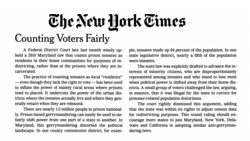New York Times editorial board praises court’s decision to uphold Maryland law ending prison-based gerrymandering
Today the New York Times printed an editorial praising a Federal District Court’s decision to uphold the 2010 law that ended prison-based gerrymandering in Maryland.
by Leah Sakala, January 17, 2012
Today the New York Times editorial board praised a Federal District Court’s decision to uphold the 2010 law that ended prison-based gerrymandering in Maryland. The law had been challenged by plaintiffs in Fletcher v. Lamone.
The editorial states:
Counting Voters Fairly
A Federal District Court late last month wisely upheld a 2010 Maryland law that counts prison inmates as residents in their home communities for purposes of redistricting, rather than at the prisons where they are incarcerated.
The practice of counting inmates as local “residents” — even though they lack the right to vote — has been used to inflate the power of mainly rural areas where prisons tend to placed. It undercuts the power of the urban districts where the inmates actually live and where they generally return when they are released.
There are about 1.5 million people in prison nationally. Prison-based gerrymandering can easily be used to unfairly shift power from one part of a state to another. In Maryland, this gerrymandering distorted the political landscape. In one county commission district, for example, inmates made up 64 percent of the population. In one state legislative district, nearly a fifth of the population were inmates.
The state law was explicitly drafted to advance the interests of minority citizens, who are disproportionately represented among inmates and who stand to lose most when political power is shifted away from their home districts. A small group of voters challenged the law, arguing, in essence, that it was illegal for the state to correct for prisoner-related population distortions.
The court rightly dismissed this argument, adding that the state was within its rights to adjust census data for redistricting purposes. This sound ruling should encourage more states to join Maryland, New York, Delaware and California in adopting similar anti-gerrymandering laws.
Case documents, related materials, and selected news coverage are available on our Fletcher v. Lamone page.




